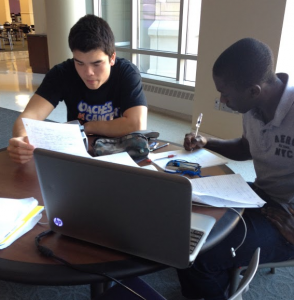Information Resources and Technologies began upgrading St. Thomas’ wireless network this month in response to frequent Wi-Fi outages this semester.
Christopher Gregg, interim vice president of IRT, said increased Wi-Fi use caused St. Thomas’ wireless network to reach its capacity.
“Wireless use has grown exponentially, and it is now considered essential,” Gregg said. “We have gradually been saturating the capacity of our wireless network, which led us to upgrading the system this year to meet those demands.”
As the demand for wireless Internet has grown across campus, the network’s performance is slowly decreasing.

Gregg said IRT replaced 247 wireless access points within the residence halls. IRT also installed 120 additional access points to improve the coverage and the wireless capacity. Prior to the upgrade, 879 wireless access points were located on campus including public areas, classrooms and residence halls. Once the upgrade is complete, 1,038 access points will be installed.
But Gregg said IRT faced some difficulties when working on access points.
“As we have been replacing and adding access points, we have run into some challenges where the default settings on the new system did not provide the coverage we anticipated,” Gregg said.
Junior Dan Czarnecki, a resident in Flynn Hall, said his Wi-Fi signal is “very inconsistent” in the residence halls.
Junior Kelly Brenny also expressed concerns about the failing connection.
“(The Wi-Fi) is usually fine during the day, but at night when everyone is using it is when I experience most of the problems,” Brenny said.
Aaron Macke, director of Residence Life, said he started to receive complaints of poor Wi-Fi early in the school year.
“About two weeks into the year, the concentrations (of complaints) were mostly Morrison Hall students who were noticing slower than normal Wi-Fi access,” Macke said.
Gregg said Residence Life is working closely with IRT to communicate updates and gather feedback on specific failures that still exist in the residence halls. He said each residence hall is constructed differently and each wireless network setting needs to be adjusted separately.
Brenny said it’s difficult to complete classwork with inconsistent Wi-Fi.
“It is harder for you to do your homework and keep up on it when half of the homework is online,” Brenny said.
However, Gregg is confident the connection is improving because of the recent upgrades.
“The feedback we have been receiving this week is that things have improved significantly in the buildings that have been upgraded,” Gregg said.
Macke also received positive feedback from students.
“We had students immediately notice the improvements with the Wi-Fi,” Macke said. “The number of concerns people have has dropped to almost nothing.”
Gregg said he doesn’t see the problem continuing in the future. After the installation of the remaining points of access and changing the settings, he said he expects the wireless network will improve significantly.
Macke is advising students to report any unusual problems right away.
“As soon as they notice anything that is out of what the norm would be for them, they should let us know right away,” Macke said.
Margaret Murphy can be reached at murp6449@stthomas.edu.

